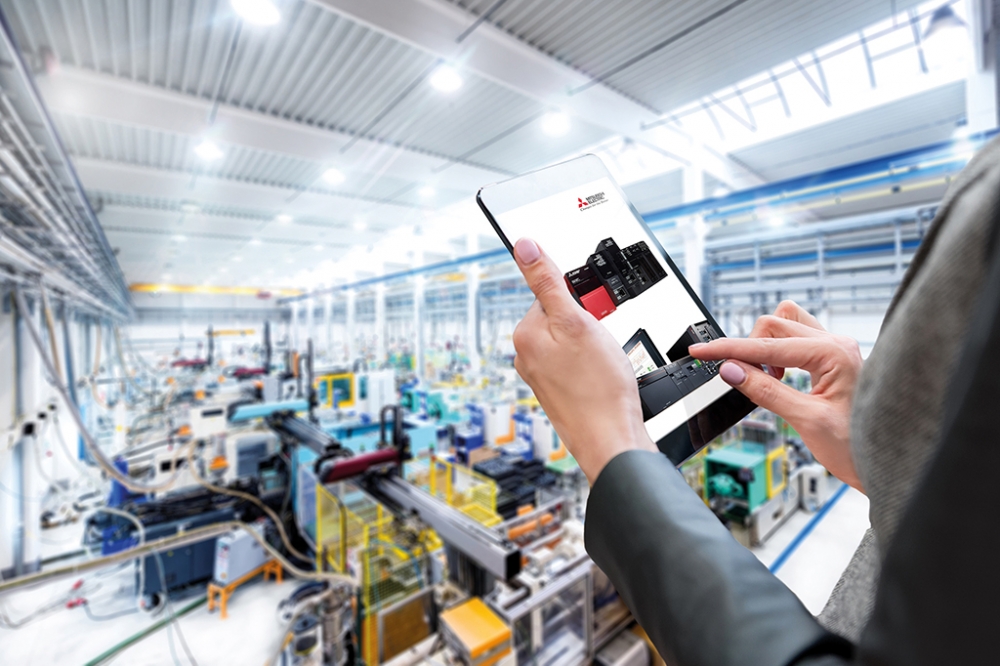Manufacturers need to leverage the power of data to be competitive

Many manufacturers agree that boosting responsiveness, productivity and flexibility on the factory floor are important keys to enhanced competitiveness.
Silicon Semiconductor invited JEREMY SHINTON, PRODUCT MANAGER FOR EDGE COMPUTING TECHNOLOGIES AT MITSUBISHI ELECTRIC, to delve into the ways that controllers designed to manage the convergence of information technology (IT) with operational technology (OT) can help ensure optimal data management and connectivity for a competitive edge
EFFICIENT DATA MANAGEMENT using the Industrial Internet of Things (IIoT) is increasingly important in extending communication beyond the production cell and ensuring the successful deployment of new and updated automation systems across manufacturing environments.
Key to bridging the gap between automation systems processing large volumes of data and the ability to turn this into intelligence that is shared with higher level enterprise systems is a new class of controller. The latest PLCs, machine controllers and industrial PCs built for IIoT applications can be used for edge computing while also supporting high-speed data logging to the cloud.
Reaching out beyond the factory floor
At the core of highly effective, futureproof production facilities is the Industrial Internet of Things. This is a network of connected devices and systems, from the factory floor all the way up to higher enterprise levels that generates and shares large volumes of data. The goal is to create unique, actionable manufacturing intelligence to improve production and plant activities resulting in increased productivity, uptime and flexibility. Businesses that leverage the power of data can therefore considerably enhance their competitive edge in a fast-changing market.
The creation of a successful IIoT application requires automation systems built on controllers with cutting-edge processing power and capacity, allowing data to be analysed closer to where it is generated. State-of-the-art PLCs, such as Mitsubishi Electric’s MELSEC iQ-R series, address these needs by featuring powerful processors and large data handling capabilities.
IIoT-ready controllers like these support advanced connectivity options, playing their part in continuously delivering data-driven information. The ability to connect to the cloud using common protocols directly on the PLC is a growing trend. The ‘connect everything’ idea means that controllers can be anywhere in the world and act as a ‘data pump’ to higher level cloud platforms. Commonly used operating systems, such as Linux, can now be hosted on PLC modules.
This enables the platform to utilise an open source and secure functionality that can easily be installed into these environments. It puts the already highly connected plant level PLC into areas using new language terminology phrases, such as JSON, REST API, MQTT, Python and the rest of the buzz words and acronyms that fill this space. These new PLC capabilities open the door to IIoT applications in all industries.
Whilst these elements are crucial to the creation of information technology (IT) driven actionable insight to improve production operations, businesses will need solutions to continuously bridge the divide between the IT world and operational technology (OT). This represents the next step in ensuring highly productive, flexible and responsive plants.
Automation that works at the Edge
To achieve this, solutions need to be implemented that can support data analysis for time-critical operational tasks and production-based analytics as well as for non-urgent but more processing-intensive data mining. These help to build an in-depth understanding of plant operations and develop actions to improve them.
Mitsubishi Electric’s latest MELIPC edge computing solution offers an ideal IT/OT merger that supports both on- and off-site data analytics functions. It features advanced analytical and artificial intelligence functionality to process data locally in real-time, utilising shop floor know-how with diagnostics and predictive maintenance feedback. As a result, the device can drive a production system’s decisions based on key data. MELIPC also pre-processes and aggregates data for higher-level insights. Thanks to OPC UA standard connectivity, the information is then shared to different platforms to improve plant operations.
A clear benefit of this hybrid solution over conventional cloud-based systems is a particularly secure as well as reliable connection and ecosystem. Highly regulated industries, such as the pharmaceutical sector, can therefore benefit from innovative data mining capabilities while still meeting regulatory compliance.

































